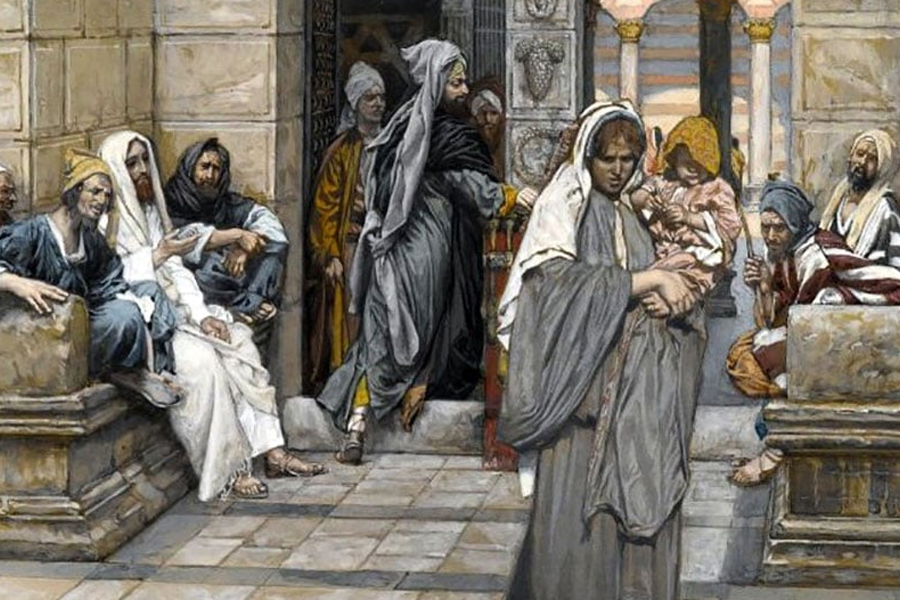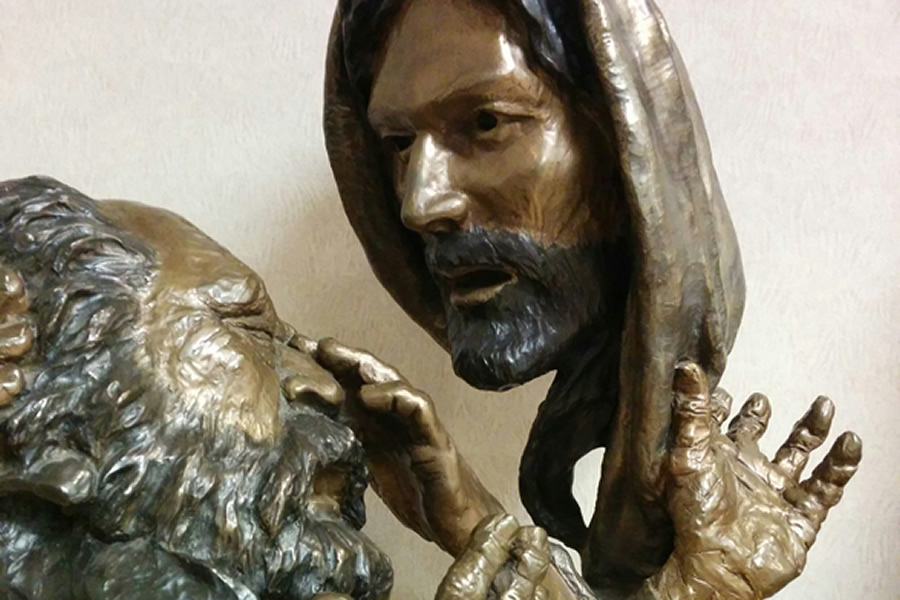St. Francis of Assisi Weekly Reflections

Love for Our Family
12-25-2021Weekly ReflectionWe Celebrate Worship Resource, Vol. 47, No. 1What makes a family a family? Is it not the love they have for each other? Ideally, that love is a selfless love, a willingness to put other family members’ needs before your own. This kind of love is modeled in today’s readings. Jesus—the perfect example of self -sacrificing love—demonstrates this love in today’s Gospel passage. He remains in his “Father’s house” for three days, a sign of his love for his divine family. He remained obedient to his parents, demonstrating his selfless love for his human family. Sirach speaks of caring for an elderly parent in a way as appropriate now as it was then: “Even if his mind fails, be considerate of him” (3:13). Hannah, who had been childless for years, selflessly offers her long-awaited child to the Lord. Paul asks us to “put on” a host or selfless qualities: “heartfelt compassion, kindness, humility, gentleness, and patience” (Colossians 3:12), and John reminds us that our love for one another is always familial, for we are all children of God. It is that selfless love, that love for a family member whose needs we put above our own, that is truly, as Paul wrote, “ the bond of perfection” (3:14).
How can you show self-sacrificing love to a family member this week? Can you show that love to others in our human family as well?
Amor por Nuestra Familia
Qué hace que una familia sea una familia? ¿No es el amor que setienen el uno al otro? Idealmente, ese amor es un amor desinteresado, la voluntad de anteponer las necesidades de otros miembros de la familia a las tuyas. Este tipo de amor está modelado en las lecturas de hoy. Jesús, el ejemplo perfecto de amor abnegado, demuestra este amor en el pasaje del Evangelio de hoy. Permanece en su “casa del Padre” durante tres días, signo suyo para su familia divina. Se mantuvo obediente a sus padres, demostrando su amor desinteresado por su familia humana. Eclesiástico habla de cuidar a un padre anciano de una manera tan apropiada ahora como entonces: “Aunque chochee, ten paciencia con él” (3:13). Ana, que no había tenido hijos durante años, ofrece desinteresadamente su hijo tan esperado al Señor. Pablo nos pide que nos “pongamos” cualidades desinteresadas: “sean compasivos, magnánimos, humildes, afables y pacientes” (Colosenses 3:12), y Juan nos recuerda que nuestro amor mutuo es siempre familiar, porque nosotros todos somos hijos de Dios. Es ese amor desinteresado, ese amor por un miembro de la familia cuyas necesidades anteponemos a las nuestras, que es verdaderamente, como escribió Pablo, “el vínculo de perfección” (3:14).
¿Cómo puedes mostrar amor abnegado a un miembro de tu familia esta semana? ¿Puedes mostrarle ese mismo amor a otros miembros de nuestra familia humana también?

Blessed is the Fruit of Your Womb
12-19-2021Weekly ReflectionWe Celebrate Worship Resource, Vol. 47, No. 1We have heard the story of Mary's visit to her cousin Elizabeth, two pregnant women blessed with child and filled with joy, countless times. But have we noticed who else was present when they met? “Elizabeth, filled with the Holy Spirit...” (Luke 1:41). Jesus was conceived in Mary’s womb by the Holy Spirit. The Holy Spirit was present in Mary, and when she greeted Elizabeth, the Holy Spirit filled her as well. Baptized in Christ, the Holy Spirit fills us as well, flowing freely from us and through us as we live our lives. Herself suddenly filled with the Holy Spirit, Elizabeth cries out, “Blessed are you among women, and blessed is the fruit of your womb” (1:42). She goes on to say, “Blessed are you who believed...” (1:45). The only time in Luke’s Gospel—or any of the other Gospels—in which the word “blessed” is used more often is in the Beatitudes. Years before Jesus gives his, Elizabeth showers the Blessed Virgin Mary with hers, honoring her cousin and anticipating God’s blessings upon the poor and lowly.
How do you bless those you meet?
Bendito el Fruto de tu Vientre
DEmos escuchado la historia de la visita de María a su prima Isabel, dos mujeres embarazadas bendecidas y llenas de alegría, innumerables veces. Pero, ¿hemos notado quién más estaba presente cuando se conocieron? “Isabel, llena del Espíritu Santo...” (Lucas 1:41). Jesús fue concebido en el vientre de María por el Espíritu Santo. El Espíritu Santo estaba presente en María, y cuando saludó a Isabel, el Espíritu Santo también la llenó. Bautizados en Cristo, el Espíritu Santo también nos llena, fluyendo libremente de nosotros y a través de nosotros mientras vivimos nuestras vidas. Ella misma llena de repente del Espíritu Santo, Isabel clama: “Bendita tú entre todas las mujeres, y bendito el fruto de tu vientre” (1:42). Ella continúa diciendo: “Dichosa tú que has creído...” (1:45). El único momento en el Evangelio de Lucas, o en cualquiera de los otros Evangelios, en el que la palabra “bendito” se usa con más frecuencia es en las Bienaventuranzas. Años antes de que Jesús le dé la suya, Isabel derrama a la Santísima Virgen María con la suya, honrando a su prima y anticipando las bendiciones de Dios sobre los pobres y humildes.
¿Cómo bendices a tu prójimo?

Wheat of the World
12-12-2021Weekly ReflectionWe Celebrate Worship Resource, Vol. 47, No. 1You wouldn't know it from his words, but Zephaniah preached during a very difficult time. God’s Chosen People had turned away from the Lord, influenced by the legacy of a corrupt king (Manasseh) and compromised by Assyrian rule. Yet he wrote, “Shout for joy!” “Be glad and exult!” (3:14). How could he say this? He believed that the people would change, for God was in their midst, ready to save them. John the Baptist came upon the scene at another difficult time. Once again, the Jewish people lived under foreign rule. Many had dishonored themselves by working for the occupying force. John called them to change. Tax collectors: Collect only what is fair. Soldiers: Stop extorting people. Everyone: Share what you have with those who don’t. God is in your midst, ready to save you, for the Messiah comes. Rejoice! Even in the darkest of times God is in our midst as well, ready to enter our hearts, ready to save us. Let us change how we live, becoming wheat for the world, giving sustenance to our neighbor as we look to be gathered into God’s kingdom.
What can you do to be “wheat of the world,” to be sustenance for your neighbor?
Trigo del Mundo
No lo sabías por sus palabras, pero Sofonías predicó durante un momento muy difícil. El Pueblo Elegido de Dios se había apartado del Señor, influenciado por el legado de un rey corrupto (Manasés) y comprometido por el gobierno asirio. Sin embargo, escribió: “¡Canta, da gritos de júbilo!” “¡Gózate y regocíjate!” (3:14). ¿Cómo pudo decir esto? cambiaría, porque Dios estaba en medio de Creía que la gente ellos, listo para salvarlos. Juan el Bautista apareció en escena en otro momento difícil. Una vez más, el pueblo judío vivió bajo un dominio extranjero. Muchos se habían deshonrado a sí mismos trabajando para la fuerza de ocupación. Juan los llamó para que se cambiaran. Recaudadores de impuestos: recauden solo lo justo. Soldados: Dejen de extorsionar a la gente. Todos: compartan lo que tiene con los que no tienen. Dios está en medio de ustedes, listo para salvarlos, porque viene el Mesías. ¡Alégrense! Incluso en los tiempos más oscuros, Dios también está entre nosotros, listo para entrar en nuestros corazones, listo para salvarnos. Cambiemos la forma en que vivimos, convirtiéndonos en trigo para el mundo, dando sustento a nuestro prójimo mientras esperamos ser recogidos en el reino de Dios.
¿Qué puedes hacer para ser “trigo del mundo”, para ser sustento para tu prójimo?

Repent your Sins
12-05-2021Weekly ReflectionWe Celebrate Worship Resource, Vol. 47, No. 1Envisioning an eventual return of the exiles to Jerusalem, Isaiah painted a beautiful image of mountains being made low, roads being made straight, and rough ways being made smooth. The vision was so powerful that centuries later Baruch echoed those words when describing the Jewish people’s return home from the Diaspora. Even more generations had passed when all four evangelists chose to quote Isaiah’s original words to describe John the Baptist’s exhortation to repent. Their sins were the mountain and hills that needed to be made low, impending their ability to follow the Lord. Likewise, our sins are obstacles on the path, perhaps a recent “mountain (to) be made low,” often “age-old depths and gorges (to) be filled to level ground” (Baruch 5:7). This Advent let John the Baptist guide us as well. Let us make smooth our path to the Lord through repentance, regretting our sins and atoning for the hurt we have caused. Good work was begun in us in baptism. During this holy season let us show that good work, preparing ourselves for our encounter with Christ, whenever and however he comes.
What specifically can you do to repent for your sins, which create obstacles on your path to follow the Lord?
Arrepenpientete de tus Pecados
Al imaginar un eventual regreso de los exiliados a Jerusalén, Isaías pintó una hermosa imagen de montañas que se rebajaron, y caminos que se enderezaron y caminos ásperos que se allanaron. La visión fue tan poderosa que siglos después Baruc hizo eco de esas palabras al describir el regreso del pueblo judío a casa desde la Diáspora. Habían pasado aún más generaciones cuando los cuatro evangelistas optaron por citar las palabras originales de Isaías para describir la exhortación de Juan el Bautista al arrepentimiento. Sus pecados eran la montaña y las colinas que necesitaban ser abatidas, lo que impedía su capacidad para seguir al Señor. Asimismo, nuestros pecados son obstáculos en el camino, tal vez una reciente “montaña para abajar”, a menudo “se rellenen todos los valles hasta aplanar la tierra” (Baruc 5:7). Este Adviento dejó que Juan el Bautista nos guiara también. Alisemos nuestro camino hacia el Señor a través del arrepentimiento, lamentándonos de nuestros pecados y expiando el daño que hemos causado. La buena obra se inició en nosotros en el bautismo. Durante este tiempo santo demostremos esa buena obra, preparándonos para nuestro encuentro con Cristo, cuando y como venga.
¿Qué puedes hacer específicamente para arrepentirte de tus pecados, especialmente esos que crean obstáculos en tu camino para seguir al Señor?

How Will You Prepare?
11-28-2021Weekly ReflectionWe Celebrate Worship Vol. 46, No. 3Today's Gospel may come as a shock on this first Sunday of Advent. “People will die of fright in anticipation of what is coming” (Luke 21:26). “For that day will assault everyone who lives on the face of the earth” (21:35). Wow. You won’t be reading those words in any Christmas cards you get this year! Today’s Gospel is not about the birth of Jesus at all; no, it is about his second coming to judge humankind at the end of time. This is what Jesus warns his disciples about. It is certainly much more pleasant to look back at his first coming as a beautiful baby than to look forward to his second coming as the ultimate judge. But we know that in between these two occasions are an infinite number of moments when Jesus comes into the world. Sometimes heartwarming, sometimes terrifying, often traumatic, our Savior continually waits to be born into our ordinary lives. Let us pray that we are prepared to welcome him however it may happen—in a manger, in an earthquake, or in some other way we least expect.
What will you do to prepare your self to welcome the Lord at any time?
¿Qué harás para Prepararte?
El evangelio de hoy puede sorrendernos en este primer domingo de Adviento. "La gente se morirá de terror por las cosas que vendrán sobre el mundo” (Lucas 21:26). “Porque caerá de repente como una trampa sobre todos los habitantes de la tierra” (21:35). Guau. ¡No leerás esas palabras en ninguna de las tarjetas de Navidad que recibas este año! El evangelio de hoy no trata en absoluto del nacimiento de Jesús; no, se trata de su segunda venida para juzgar a la humanidad al final de los tiempos. Esto es sobre lo que Jesús advierte a sus discípulos. Ciertamente es mucho más agradable recordar su primera venida como un hermoso bebé que esperar su segunda venida como el juez supremo. Pero sabemos que entre estas dos ocasiones hay un número infinito de momentos en los que Jesús viene al mundo. A veces conmovedor, a veces aterrador, a menudo traumático, nuestro Salvador espera continuamente nacer en nuestra vida cotidiana. Oremos para que estemos preparados para darle la bienvenida sin importar lo que suceda: en un pesebre, en un terremoto o de alguna otra manera que menos esperemos.
¿Qué harás para prepararte para recibir al Señor en cualquier momento?

How Do You Listen to the Lord's Voice?
11-21-2021Weekly ReflectionWe Celebrate Worship Vol. 46, No. 3We have quite a bit about the kingdom of God over the last few weeks. Recall that Jesus assured the sincere questioner that he was “not far from the kingdom of God” (Mark 12:34). On the solemnity of All Saints, we heard Jesus teach that the poor in spirit and the unjustly persecuted would inherit the kingdom of God. (Matthew uses the synonymous term “kingdom of heaven.”) Today we hear Jesus refer to the kingdom when questioned by Pilate. Later, as always, we will pray the Lord’s Prayer, praying that God’s kingdom will come. When Jesus spoke in parables, he often did it to describe the kingdom of God. The kingdom of God is the culmination of Jesus’ life here on earth and the goal of each of ours. Daniel envisioned the kingdom when he spoke of the Son of Man’s everlasting dominion. The author of Revelation attests that Jesus Christ has made us into a kingdom. The kingdom of God is in our grasp as long as Jesus reigns in our lives, guiding us to the truth, guiding us to himself.
How do you listen to the Lord’s voice? How have you testified to the truth?
¿Cómo escuchas la voz del Señor?
Hemos escuchado bastante sobre el reino de Dios durante las últimas semanas. Recuerda qu Jesús le aseguró al sincero interrogador que él “no está lejos del reino de Dios” (Marcos 12:34). En la solemnidad de Todos los Santos, escuchamos a Jesús enseñar que los pobres de espíritu y los perseguidos injustamente heredarían el reino de Dios. (Mateo usa el término sinónimo “reino de los cielos”). Hoy escuchamos a Jesús referirse al reino cuando Pilato lo interroga. Más tarde, como siempre, rezaremos el Padrenuestro, orando para que venga el reino de Dios. Cuando Jesús hablaba en parábolas, a menudo lo hacía para describir el reino de Dios. El reino de Dios es la culminación de la vida de Jesús aquí en la tierra y la meta de cada uno de los nuestros. Daniel imaginó el reino cuando habló del dominio eterno del Hijo del Hombre. El autor de Apocalipsis da fe de que Jesucristo nos ha convertido en un reino. El reino de Dios está a nuestro alcance mientras Jesús reine en nuestras vidas, guiándonos a la verdad, guiándonos hacia Él.
¿Cómo escuchas la voz del Señor? ¿Cómo has testificado de la verdad?

We Shall Be Like Stars Forever
11-14-2021Weekly ReflectionWe Celebrate Worship Vol. 46, No. 3Every year around this time we hear scriptural passages with terrifying images of the end of the world: “A time unsurpassed in distress,” “the sun will be darkened,” “the stars will be falling from the sky” (Daniel 12:1; Mark 13:24, 25). These days, whenever a number of terrible things happen around the same time, we joke that the world is coming to an end. But it was not a joke to those who first heard the words we hear today. Daniel and Mark wrote during times of great persecution for Jewish people, and then for Christian people as well. But they did not write just to terrify their audience. They also wrote to comfort their listeners, to give hope during times of persecution. Though terrible things will happen, those in God’s favor will be rescued. “Your people shall escape,” “some shall live forever,” the Son of Man... (will) gather his elect from the four winds” (Daniel 12:1, 2; Mark 13:26-27). In every era, it is worth being reminded that one day life on earth will come to an end. It might be soon; it might be thousands of generations from now. As Jesus told his disciples, we cannot know. But while we live, we strive to lead others in God’s right paths, so that we “shall be like the stars forever” (Daniel 12:3).
How have you led others to justice? How will you do so in the future?
Seremos como las Estrellas a por siempre
Cada año, para esta época, escuchamos pasajes de las Escrituras con imágenes aterradoras del fin del mundo: “Un tiempo de angustia sin igual”, “el sol se oscurecerá”, “las estrellas caerán del cielo” (Daniel 12:1; Marcos 13:24, 25). En estos días, cada vez que suceden una serie de cosas terribles al mismo tiempo, bromeamos diciendo que el mundo está llegando a su fin. Pero no fue una broma para quienes escucharon por primera vez las palabras que escuchamos hoy. Daniel y Marcos escribieron durante tiempos de gran persecución para el pueblo judío, y luego también para el pueblo cristiano. Pero no escribieron solo para aterrorizar a su audiencia. También escribieron para consolar a sus oyentes, para dar esperanza en tiempos de persecución. Aunque sucederán cosas terribles, los que estén a favor de Dios serán rescatados. “Se salvará tu pueblo”, “algunos para la vida eterna”, el Hijo del Hombre... (reunirá) a sus elegidos desde los cuatro puntos cardinales” (Daniel 12:1, 2; Marcos 13:26-27). En todas las épocas, vale la pena recordar que un día la vida en la tierra llegará a su fin. Podría ser pronto; podrían pasar miles de generaciones a partir de ahora. Como Jesús les dijo a sus discípulos, no podemos saber. Pero mientras vivimos, nos esforzamos por guiar a otros por los caminos rectos de Dios, para que “seamos como las estrellas por siempre” (Daniel 12:3).
¿Cómo has llevado a otros a la justicia? ¿Cómo lo harás en el futuro?

She Gave All She Had
11-06-2021Weekly ReflectionWe Celebrate Worship Vol. 46, No. 3It's impossible to overtate how difficult life was for a widow in Jesus’ time or Elijah’s. When a woman married she left the protection of her father and family and became dependent on her husband. If he died first, she lost not only her husband but also her source of income, her economic security, and often whatever wealth her family had due to inheritance laws. When Jesus says that this widow “contributed all she had,” he was not exaggerating (Mark 12:44). Why, then, did she give her last penny to the temple treasury? For that matter, why did the widow on her deathbed give her last morsel of food to Elijah, this foreign stranger? These poor widows have sacrificed all they had, becoming absolutely dependent on God. They trusted that God would provide. God does provide, in fact through people like them, people whose generosity provides life to others. This is the lesson Jesus ultimately teaches from the cross. After having given up his (divine) privilege, his home, and all his worldly belongings, he gives his very life as the perfect example of his generosity and faith. As Hebrews says, he is dependent on God for life itself.
When have you given of yourself even when you had little to offer? How can you do so now?
Ella Dio Todo lo Que Tenía
Es imposible exagerar lo difícil que fue la vida para una viuda en la época de Jesús o de Elías. Cuando una mujer se casaba, dejaba la protección de su padre y su familia y se volvía dependiente de su marido. Si él moría primero, ella perdía no solo a su esposo, sino también su fuente de ingresos, su seguridad económica y, a menudo, la riqueza que tenía su familia debido a las leyes de herencia. Cuando Jesús dice que esta viuda “contribuyó con todo lo que tenía”, no estaba exagerando (Marcos 12:44). Entonces, ¿por qué dio su último centavo al tesoro del templo? De hecho, ¿por qué la viuda en su lecho de muerte le dio su último bocado de comida a Elías, este extraño extranjero? Estas pobres viudas han sacrificado todo lo que tenían, volviéndose absolutamente dependientes de Dios. Confiaron en que Dios proveería. Dios proporciona, de hecho, a través de personas como ellos, personas cuya generosidad da vida a los demás. Esta es la lección que Jesús finalmente enseña desde la cruz. Después de haber renunciado a su privilegio (divino), su hogar y todas sus pertenencias mundanas, da su misma vida como el ejemplo perfecto de su generosidad y fe. Como dice Hebreos, él depende de Dios para la vida misma.
¿Cuándo has dado de ti mismo incluso cuando tenías poco que ofrecer? ¿Cómo puedes hacerlo ahora?

Love Your Neighbor
10-31-2021Weekly ReflectionWe Celebrate Worship Resource, Vol. 46, No. 3Teachers of the Jewish faith were often asked the question that we hear one of the scribes ask Jesus today. There are 613 commandments in the Torah (not just ten!). Was there a single overarching commandment—one from which all else flowed? Jesus, however, pairs two: love of God and love of neighbor. It seems as if this is a sneaky way to squeeze two commandments into one, but from God’s perspective these two are necessarily linked as one. We are all created in the image of God. We speak of the ability to see the face of Christ when we look deeply at others, especially those in need. The Holy Spirit dwells within us. So when we love our neighbor, we are loving God in them. Jesus’ questioner points out that these commandments are “worth more than all burnt offerings and sacrifices,” showing that he truly understood how to love God and neighbor (Mark 12:33). Jesus would soon make the ultimate offering, the ultimate sacrifice, out of his infinite love for others. We are now challenged to show self-sacrificial love for God and for our neighbor as well.
How do you see your love for God expressed in your love for your neighbor?
Ama a Tu Prójimo
A kos maestros de la fe judía a menudo se les hacía la pregunta que escuchamos que uno de los escribas le hace a Jesús hoy. Hay 613 mandamientos en la Torá (¡no solo diez!). ¿Había un solo mandamiento general, uno del que todo lo demás fluyera? Jesús, sin embargo, empareja dos: amor a Dios y amor al prójimo. Parece como si esta fuera una de comprimir dos mandamientos en uno, manera engañosa pero desde la perspectiva de Dios, estos dos están necesariamente vinculados como uno. Todos fuimos creados en la imagen de Dios. Hablamos de la capacidad de ver el rostro de Cristo cuando miramos profundamente a los demás, especialmente a los necesitados. El Espíritu Santo habita dentro de nosotros. Entonces, cuando amamos a nuestro prójimo, amamos a Dios en él. El interlocutor de Jesús señala que estos mandamientos "valen más que todos los holocaustos y sacrificios", lo que demuestra que él realmente entendía cómo amar a Dios y al prójimo (Marcos 12:33). Jesús pronto haría la ofrenda suprema, el sacrificio supremo, de su amor infinito por los demás. Ahora tenemos el desafío de mostrar amor abnegado por Dios y también por nuestro prójimo.
¿Cómo ves tu amor por Dios expresado en tu amor por tu prójimo?

Though today's Gospel concerns a blind man healed by Jesus and last Sunday’s dealt with two disciples asking Jesus for a special place in the kingdom, these two successive passages in Mark have strong parallels. Atypically, the blind man’s name is given: “Bartimaeus,...the son of Timaeus” (10:46), as were the disciples last week: “James and John, the sons of Zebedee” (10:35). Jesus asks both the same question: “What do you want/wish me to do for you?” (10:36, 10:51). But now the stories diverge. James and John ask for privilege; Bartimaeus asks for pity. The disciples ask Jesus for more than he can give, not understanding, not seeing, how much they are asking for. The blind man, knowing that he can’t see. Asks for that ability. Bartimaeus is willing to make a complete transformation. He tosses away his cloak, which he would have used to collect the coins he was given. Allowed to go his own way, he chose instead to follow Jesus on his way. Even before he could see, he recognized Jesus as the Messiah (“Son of David”) and “Master.” After his encounter, he became a disciple.
How do you answer Jesus’ question: “What do you want me to do for you?”
“¿Qué quieres que haga por ti?”
Aunque el Evangelio de hoy se refiere a un ciego sanado por Jesús y el del domingo pasado trataba de dos discípulos que le pedían a Jesús un lugar especial en el reino, estos dos pasajes sucesivos de Marcos tienen fuertes paralelos. Atípicamente, se da el nombre del ciego: “Bartimeo,...el hijo de Timeo” (10:46), como lo fueron los discípulos la semana pasada: “Santiago y Juan, los hijos de Zebedeo” (10:35). Jesús les hace a ambos la misma pregunta: “¿Qué quieres/deseas que haga por ti?” (10:36, 10:51). Pero ahora las historias divergen. Santiago y Juan piden privilegios; Bartimeo pide piedad. Los discípulos le piden a Jesús más de lo que él puede dar, sin entender, sin ver, cuánto están pidiendo. El ciego, sabiendo que no puede ver. Pide esa habilidad. Bartimeo está dispuesto a realizar una transformación completa. Arroja su capa, que habría utilizado para recoger las monedas que le dieron. Permitido seguir su propio camino, eligió en cambio seguir a Jesús en su camino. Incluso antes de que pudiera ver, reconoció a Jesús como el Mesías (“Hijo de David”) y “Maestro”. Después de su encuentro, se convirtió en discípulo.
¿Cómo respondes a la pregunta de Jesús: "¿Qué quieres que haga por ti?"

We Are Called to Serve Others
10-17-2021Weekly ReflectionWe Celebrate Worship Resource, Vol. 46, No. 3That's not what When you take on a new commitment only to find out that it required a lot more from you than expected? This is what the Twelve are experiencing right now. They really didn’t understand what they were getting into when they chose to follow Jesus. Healings and miracles have been wonderful. Now they’d like a special place in this kingdom Jesus has been talking up. So when Jesus asks James and John if they can drink the cup that he drinks they immediately say yes. But then they discover that the cup, the cross, their baptism, is not easy at all. Jesus expects them not to be served, but to serve. He tells them— again—that he came to give his life for others. He tells them “the baptism with which I was baptized, you will be baptized” (Mark 10:39). We have been baptized into this mission as well. Wherever it may lead us, we are called to serve others. As it did for Isaiah as well, it will involve suffering. But, as we hear in the second reading, we have in Jesus someone who willingly took on the human experience to whom we can always appeal to for help and mercy.
Over the week ahead how can you live out your baptismal call to serve others?
Estamos llamados a Servir a los Demás
¡Eso no es para lo que me inscribí! ¿Cuando asume un nuevo compromiso y descubre que requiere mucho más de lo esperado? Esto es lo que los Doce están experimentando en este momento. Realmente no entendían en qué se estaban metiendo cuando eligieron seguir a Jesús. Las sanaciones y los milagros han sido les gustaría un lugar especial en este reino maravillosos. Ahora que Jesús ha estado hablando. Entonces, cuando Jesús les pregunta a Santiago y Juan si pueden beber de la copa que él bebe, inmediatamente dicen que sí. Pero luego descubren que la copa, la cruz, su bautismo, no es nada fácil. Jesús espera que no se les sirva, sino que sirvan. Les dice, de nuevo, que vino a dar su vida por los demás. Les dice “y con el bautismo con el que yo fui bautizado, ustedes serán bautizados” (Marcos 10:39). También hemos sido bautizados en esta misión. Dondequiera que nos lleve, estamos llamados a servir a los demás. Como lo hizo también con Isaías, implicará sufrimiento. Pero, como escuchamos en la segunda lectura, tenemos en Jesús a alguien que asumió voluntariamente la experiencia humana a quien siempre podemos pedir ayuda y misericordia.
Durante la próxima semana, ¿cómo puedes vivir tu llamado bautismal para servir a los demás?

What Possessions Are Controlling You?
10-10-2021Weekly ReflectionWe Celebrate Worship Resource, Vol. 46, No. 3Today we hear of the most familiar saying of Jesus: “It is easier for a camel to pass through the eye of a needle that for one who is rich to enter the kingdom of God” (Mark 10:25). It astonished the disciples, but perhaps we shrug it off because we’re not “rich”, not part of the ldquo;one percent”. Not so fast! Most of us are actually richer than this rich young man. After all, we have possessions unimaginable two thousand years ago: sturdy homes with electricity and plumbing, SUVs and smartphones, well-stocked closets and pantries and freezers. So maybe our faces should fall as well. Do we need to give away what we have to follow Jesus? How do we gain treasure in heaven while retaining our won earthly treasures? This is the challenge Jesus issues, a challenge that started his disciples murmuring. Let his response console us: “For human beings it is impossible, but...all things are possible for God” (10:27). We may not be able to give up our possessions, but we can always place our trust in a loving and merciful God. In the first reading, Solomon asked God for wisdom over riches. The author of Hebrews assets that the word of God can penetrate our very beings. Let us be guided by God’s word and the Holy Spirit’s wisdom, not driven by our many possessions.
What possessions are controlling your life? What can you give up?
¿Qué Posesiones Están Controlándote?
Hoy escuchmos uno de los dichos más familiares de Jesús: “Más fácil es pasar un camello por el ojo de una aguja, que entrar un rico en el reino de Dios.” (Marcos 10:25). Asombró a los discípulos, pero quizás lo ignoramos porque no somos “ricos”, no somos parte del “uno por ciento”. ¡No tan rápido! La mayoría de nosotros somos más ricos que este joven rico. Después de todo, tenemos posesiones inimaginables hace dos mil años: casas robustas con electricidad y plomería, vehículos deportivos utilitarios y teléfonos inteligentes, armarios, despensas y congeladores bien surtidos. ¿Necesitamos regalar lo que tenemos para seguir a Jesús? ¿Cómo obtenemos tesoros en el cielo mientras retenemos nuestros tesoros terrenales ganados? Este es el desafío que plantea Jesús, un desafío que hizo que sus discípulos murmuraran. Dejemos que su respuesta nos consuele: “Para el hombre es imposible, pero ... todo es posible para Dios”
(10,27). Es posible que no podamos renunciar a nuestras posesiones, pero siempre podemos atar nuestra confianza en un Dios amoroso y misericordioso. En la primera lectura, Salomón le pidió a Dios sabiduría sobre las riquezas. El autor de Hebreos afirma que la palabra de Dios puede penetrar en nuestro propio ser. Dejémonos guiar por la palabra de Dios y la sabiduría del Espíritu Santo, no impulsados por nuestras muchas posesiones.
¿Qué posesiones están controlando tu vida? ¿A qué puedes renunciar?

We Are Called To Be Co- Creators
10-03-2021Weekly ReflectionWe Celebrate Worship Resource, Vol. 46, No. 3God did not want the first human to be alone. In order to improve the situation, God allowed for the first person to assist in the creative process. He was able to name the animals, then gave part of his own body to enable God to create a suitable partner. The two became “one flesh,” together creating a new entity: a married couple (Genesis 2:24). Jesus quotes this passage when addressing the Pharisees’ question about divorce. Married partners become co-creators, and as Jesus points out, each is equally responsible for respecting that new creation. In a fruitful marriage, they go on to have children, to create new life. Jesus holds children up as examples to follow. The children he welcomes in the Gospel accept the kingdom of God with a wonder and openness often lacking in skeptical, headstrong adults. Let us not forget that we are always God’s children. We have been created in God’s image. Though grown up, we are still dependent on God’s continued blessings. Sisters and brothers of the Lord, as the author of Hebrews point out, we are both children and adults, both creation and creators, partners in bringing the kingdom to fruition.
What can you do to create a holier parish, neighborhood, and world?
Estamos llamados a ser cocreadores
Dios no quería que el primer humano estuviera solo. Para mejorar la situacíon, Dios permitió a la primera persona asistir en el proceso creativo. Le permitió nombrar a los animales, luego dio parte de su propio cuerpo para permitir a Dios crear un compañero adecuado. Los dos se convirtieron en “una sola carne”, juntos creando una nueva entidad: una pareja casada (Génesis 2:24). Jesús cita este pasaje al abordar la pregunta de los fariseos sobre el divorcio. Las parejas casadas se convierten en cocreadores, y como Jesús señala, cada uno es igualmente responsable de respetar esa nueva creación. En un matrimonio fructífero, continúan teniendo hijos, para crear nueva vida. Jesús sostiene a los niños como ejemplos a seguir. Los niños que recibe en el Evangelio aceptan el reino de Dios con una maravilla y la apertura que a menudo faltan en adultos escépticos y tachadores. No olvidemos que siempre somos los hijos de Dios. Hemos sido creados en la imagen de Dios. Aunque crecimos, todavía dependemos de las bendiciones continuas de Dios. Hermanas y hermanos del Señor, como lo señala el autor de Hebreos, somos niños y adultos, tanto la creación como los creadores, socios para llevar el reino a buen término.
¿Qué puedes hacer para crear una parroquia, vecindario y mundo más santo?